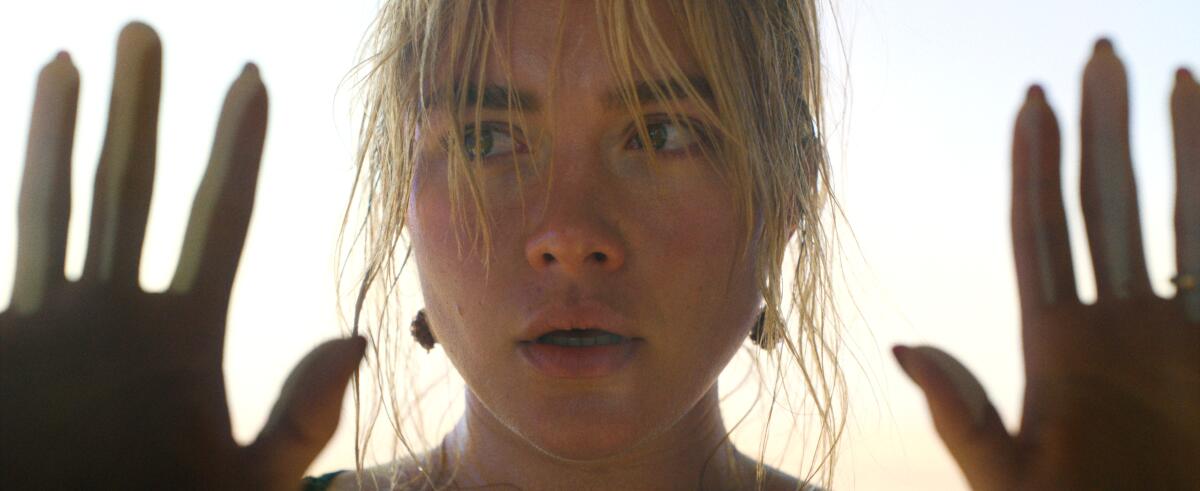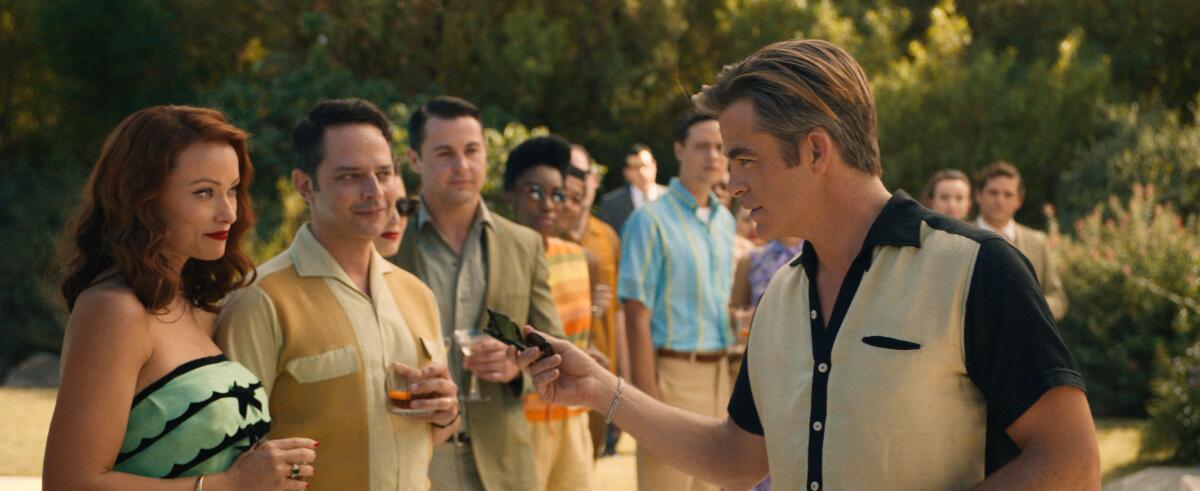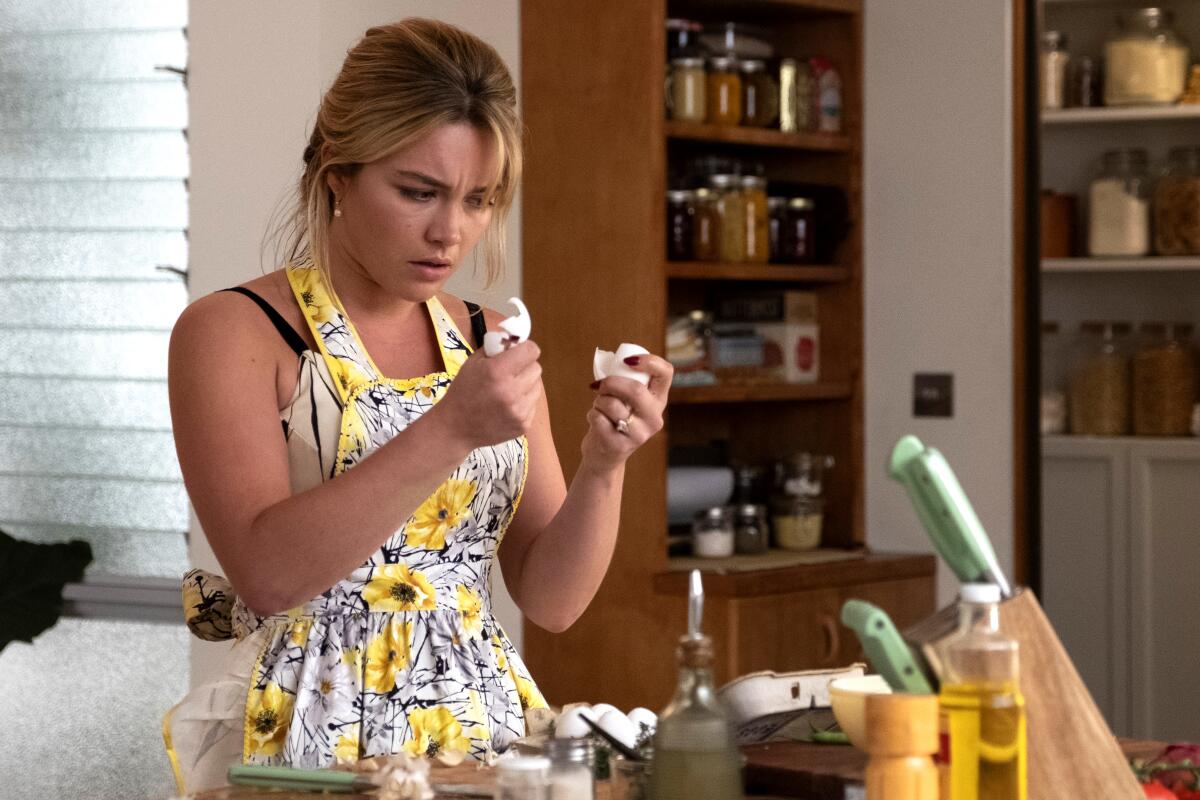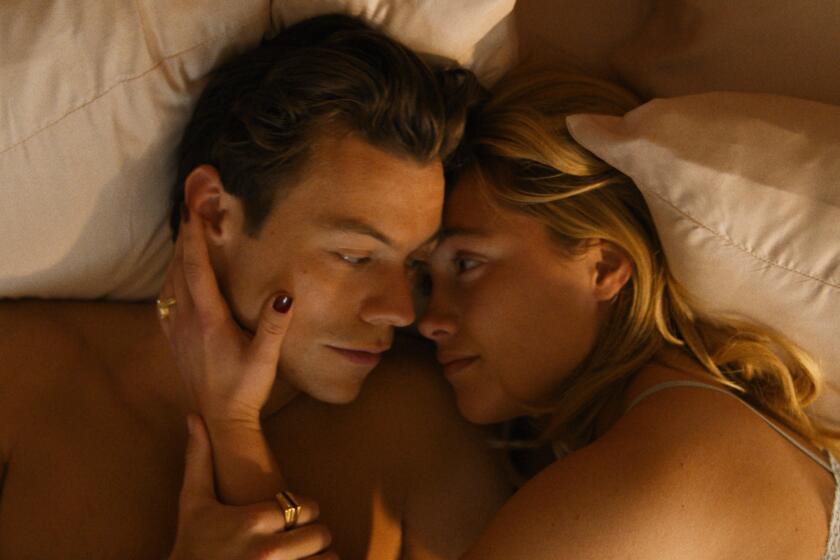Review: Olivia Wilde’s scandal-ridden ‘Don’t Worry Darling’ isn’t good — or bad — enough

- Share via
In Olivia Wilde’s trouble-in-paradise thriller “Don’t Worry Darling,” Florence Pugh plays a devoted housewife called Alice, a common enough name that here evokes a few famous antecedents. Watching her go about her daily routine — cooking every meal, cleaning the house from top to bottom and venturing into town for the occasional grocery run — you might be reminded of Alice Kramden. That’s true even if Pugh’s Alice seems to inhabit a brighter, comfier (if less funny) vision of 1950s domesticity than “The Honeymooners,” one that’s awash in Midcentury Modern splendor and sits at the end of a picture-perfect desert cul-de-sac. It helps that Alice has a husband, Jack (Harry Styles), who’s more or less the anti-Ralph, and not just because he thinks nothing of sweeping the dinner plates aside and treating his wife as a tabletop amuse-bouche.
After a while, though, you might be reminded of a very different Alice, the one who finds herself adrift in a strange, often sinister land where everything and everyone is a surreal imitation of life. And Pugh’s Alice, at first cheerfully accepting of the status quo, soon starts asking dangerous questions. Who exactly is Frank (a silky-smooth Chris Pine), the combination corporate boss, town mayor and cult leader who exerts such a hold on Alice and Jack and the other couples living in this sunbaked utopia? What is the nature of the Victory Project, the top-secret government enterprise that employs Jack and the other husbands on their block? The answers threaten to push Alice through the proverbial looking glass, whether she’s beholding a nightmarish vision in the mirror or cleaning a large window that suddenly closes in on her, underscoring her entrapment with an all-too-literal thud.
For your safety
The Times is committed to reviewing theatrical film releases during the COVID-19 pandemic. Because moviegoing carries risks during this time, we remind readers to follow health and safety guidelines as outlined by the CDC and local health officials.
And “Don’t Worry Darling,” for all its sinister undercurrents and feints at subversion, turns out to be a disappointingly heavy thud of a movie. Directed by Olivia Wilde and written by Katie Silberman (from a story credited to Silberman, Carey Van Dyke and Shane Van Dyke), it’s a handsomely assembled, increasingly transparent thriller that stomps when it should creep and drags when it should accelerate. Mainly it reminds you of the many earlier, better pictures it consciously resembles; I’m loath to name too many of them and risk spoiling the story’s meager surprises. Suffice to say that Wilde and Silberman have conceived what often plays like a Palm Springs-shot derivation of “The Stepford Wives,” or perhaps an old Douglas Sirk melodrama by way of “The Truman Show.”

For a gaslighting thriller about suburban malaise and retrograde gender politics, it’s not an unpromising setup. For a while, you’re held by the sheer weirdness of this isolated, master-planned community, and also by the bright-colored surfaces of Katie Byron’s Atomic Age production design. Day after day, Alice and her fellow wives exchange beaming smiles and go through their robotically synchronized rituals. Not that there aren’t differences between households: While Alice doesn’t have kids (yet), her best friend, Bunny (Wilde), has two young children, and another neighbor, Peg (Kate Berlant), is expecting.
Notably, too, not every resident of this community is white, which is one sign that this isn’t the typical Hollywood ’50s flashback. Among the exceptions are Frank’s wife, Shelley (a nicely chilled Gemma Chan); Peg’s husband, Pete (Asif Ali); and Margaret (KiKi Layne), a depressive insomniac whose violent unraveling provides an early clue that all is not well. Then again, “clue” might be too subtle a word. At a certain point — around the time Alice’s eyes fall on a secret folder labeled “SECURITY RISK” (because “PLOT TWIST INCOMING” would’ve been too obvious) — what’s meant to be creepily insinuating in “Don’t Worry Darling” turns laughably blunt.
Anyone who was rightly charmed by Wilde’s 2018 directing debut, “Booksmart,” with its furious pacing and whip-smart comedy, may be surprised by the peculiar leadenness of this sophomore slump. Again and again she falls back on derivative, unilluminating beats, as when the horrors of daily drudgery are conveyed by repeatedly smash-cutting to closeups of sizzling bacon and eggs. The director also leans too hard on a John Powell score whose moodily percussive singsong tends to overwhelm rather than deepen Alice’s mounting sense of dread.

Wilde’s most arresting visual flourish is to reference the kaleidoscopic dance spectacles of Busby Berkeley, as Alice is repeatedly struck by black-and-white visions of 1930s-style showgirls dancing in circular formations. These vertiginous, fast-dissolving visions add to a growing sense of temporal dislocation; they also fuel the vibe of a male-orchestrated world where women exist to perform and be looked at. And so, in a pileup of hallucinations, vehicular accidents, menacing dinner parties and inevitable accusations of hysteria, “Don’t Worry Darling” becomes a retro-toned #MeToo liberation story, in which a woman gradually realizes the full extent of the nightmare she’s in and makes a desperate run for the exits.
It’s an intriguing story that becomes less and less interesting by the minute. That’s partly because the movie spends much too long on the buildup and partly because, for gender politics, he-said-she-said mystery and sheer narrative juice, “Don’t Worry Darling” has been more or less eclipsed by its own much-publicized production history. If you follow celebrity gossip and movie-biz headlines, you’ve probably read a thing or two about that history, particularly the behind-the-scenes imbroglios swirling around Wilde, her off-screen romance with Styles and the fact that Jack was originally meant to be played by Shia LaBeouf.
Few recent films have arrived with as much dramatic backstory as Olivia Wilde’s latest, starring Harry Styles and Florence Pugh. Here’s what to know.
You may have also heard whispers of a beef between Wilde and Pugh, who has been conspicuously tight-lipped even as the movie’s fall rollout — officially launched at this week’s Venice International Film Festival premiere, where Pugh was absent from a promotional press conference — has slipped into damage-control mode. Does that make Pugh the living embodiment of her heroine, a much-abused woman quietly but determinedly eyeing the exits? (Her unsurprisingly empathetic on-screen performance makes a decent case.) Or could Alice in fact be a more fitting stand-in for Wilde, a talented director trying to fight her way out of a misogynistic system, one that wouldn’t blink twice at a male filmmaker in a similar position?
These are diverting but also depressing questions, and this is a review of a movie, not of a publicity campaign. If “Don’t Worry Darling’s” back story has become the year’s most appalling Hollywood train wreck, the movie itself, to some relief but also some disappointment, is nothing of the sort. Wilde’s failure here is primarily one of imagination. Her movie is competently acted, handsomely crafted and not half as disturbing as it wants to be. It’s nothing to worry about.
'Don't Worry Darling'
Rating: R, for sexuality, violent content and language
Running time: 2 hours, 2 minutes
Playing: Starts Sept. 23 in general release
More to Read
Only good movies
Get the Indie Focus newsletter, Mark Olsen's weekly guide to the world of cinema.
You may occasionally receive promotional content from the Los Angeles Times.












